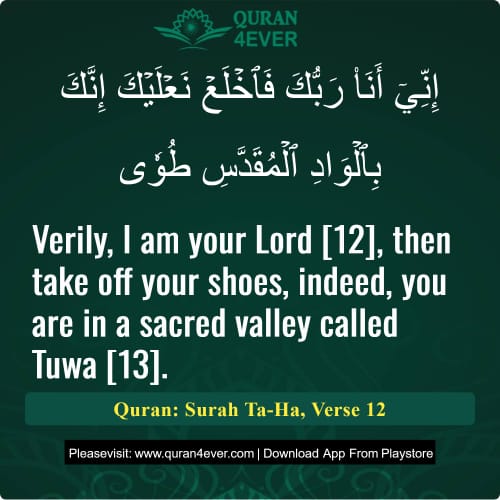
Transliteration:( Inneee Ana Rabbuka fakhla' na'laika innaka bilwaadil muqaddasi Tuwaa )
"Verily, I am your Lord [12], then take off your shoes, indeed, you are in a sacred valley called Tuwa [13]."
The sound came from the tree, but the tree itself was not Allah. Rather, it served as a medium reflecting His divine speech—much like how a radio reflects a speaker's voice, though the device itself does not speak.
Similarly, saints immersed in divine ecstasy, like those who uttered “Anal Haq” (I am the Truth) or “Ya Subhani Ma Azamu Shaani” (O My Glorified Self, how great is My glory!), did not speak these words out of ego or self-claim, but rather in a state of spiritual absorption, becoming like a reflective vessel of the Divine.
From this arise three important points:
Sacred places like the jungles of Makkah and Madinah are to be honored, as they are divinely sanctified lands.
Removing one’s shoes in such sacred areas is a practice of the Prophets, and thus, it is recommended to remove shoes when entering a mosque, even if the mosque is clean.
While Hazrat Musa (عليه السلام) was commanded to remove his shoes, there is no proof that the Holy Prophet ﷺ was given such a command even on the night of Mi'raj, despite receiving divine speech.
The tafsir of Surah Ta-Ha verse 12 by Ibn Kathir is unavailable here.
Please refer to Surah Taha ayat 11 which provides the complete commentary from verse 11 through 16.
(20:12) Verily I am your Lord! Take off your shoes.[7] You are in the sacred valley, Tuwa![8]
7. Probably, it is because of this that the Jews do not say their prayers with their shoes on. The Prophet (peace be upon him), however, removed this misunderstanding, saying: Act in contrast to the practice of the Jews who do not say their prayers with their shoes or leather socks on. (Abu Daud). It does not, however, mean that one must say his prayers with the shoes on, but it is merely to make it lawful to say prayers with shoes on. This is confirmed by another tradition, related by Abu Daud from Amar bin Aas, that he had seen the Prophet (peace be upon him) saying his prayer both with and without the shoes. There are other traditions also to this effect but it should also be kept in mind that there were no carpets, mats, etc. in the mosques in those days, not even in the Prophet’s (peace be upon him) Mosque. Therefore it would be improper to go with shoes on into the mosques of today which have carpets, mats, etc. However, one may say his prayer on grassy plots or open ground with shoes on.
8. In general, the commentators are of the opinion that Tuwa was the name of the valley, but according to some, it is the valley that had been made sacred for the time being.

For a faster and smoother experience,
install our mobile app now.
Related Ayat(Verses)/Topics